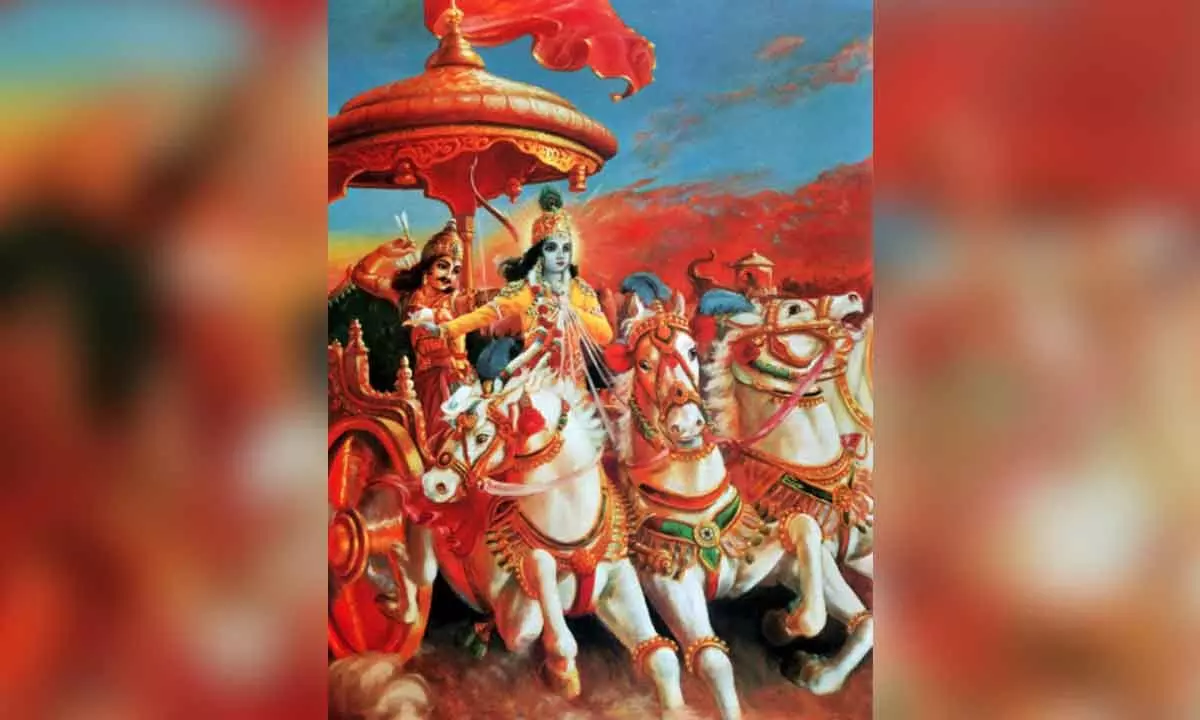Live
- Study Reveals Teabags Release Billions of Microplastics and Nanoplastics, Entering Your Body
- Workplace Wonders: Creative Secret Santa Gifts for Colleagues
- Kumbh Mela 2025: Essential Guide to Comfortable and Respectful Attire for Maha Kumbh
- Hyderabad Real Estate Faces Setback: Property Sales Drop 7% Year-on-Year in 2024
- Gnani’s Gen AI Solutions Revolutionising BFSI
- Congress Party Celebrates Christmas in Gadwal District with Unity and Joy
- Trump's WHO threat sparks debate on the efficiency of global health governance
- ICC Champions Trophy 2025 Schedule: India vs Pakistan Match Set for February 23 in Dubai
- Champions Trophy 2025: Full Schedule, Match Dates, Venues, Timings, and Updates
- FRAI Urges Government to Provide Technology Platform for Kirana Stores to Stay Competitive
Just In
Social Consciousness: Tips for reading the Gita


The Gita aims at bringing about an inner purity which is the prerequisite for enquiry into the nature of reality. A person with a prejudiced mind cannot honestly enquire. The highest goal of human life is to know the reality, which is beyond religion, race, caste, or belief
The first piece of advice by the traditional teachers is, ‘Do not read The Gita on your own but listen to a teacher’. This hurts our ego, but there is no other way. If I read on my own, I may find that Krishna contradicts himself in some places, and as a brilliant critic, I may say that one statement is an interpolation. This is because when Krishna refers to himself, he sometimes speaks as the mouthpiece of the Supreme Reality, Brahman, and sometimes as the creator and controller of the universe. We know that the Upanishads analyze reality at the absolute and practical levels. We have to know from which point Krishna is speaking.
Besides, commentators of various traditions (such as non-dual, dual or Vaishnava, Shaiva, etc., traditions) have written elaborately on the Gita. Each tried to explain the Gita as justifying its idea of God. Sometimes there may be references to contemporaneous philosophical schools. In one place, there may be a reference to excess ritualism; it may be commenting on the dualists; in another, it may be referring to nihilists. If we know the context, we would feel that there are relevant discussions (for example, on yajna or rituals) or that it is abstruse. Hence, listen to a teacher.
The above advice is for one who wants to master the Gita and know answers for philosophical questions like the nature of God, number of gods or idol worship, etc. But if we are not made of such sterner stuff, we can read the verses which relate to human psychology and ethics. Plenty of them can be understood from the English explanations of teachers like Swami Vivekananda, Chinmayananda or Sivananda. Vivekananda’s books are an excellent introduction to the Gita.
The Gita’s message is not that we should all become sanyasis or that we should become warriors but that one has to perform one’s duty, dharma, in any field of work. This duty depends on the innate nature of a person. The Gita is an excellent analysis of human nature. Just as modern psychologists analyze personality types, Gita discusses universal personality types. Krishna analyzes several social interactions, such as the right type of charity, the right type of austerity, the right type of worship, the right frame of mind, the right food, the right happiness, and the right God. Tell me your God, and I will tell you what you are, says Krishna (17-4). A person of sattva nature sees oneness in many and unity in diversity, whereas a person of rajo guna sees diversity (18-21).
There are several simple verses in which Krishna tells Arjuna, ‘You do like this’. These are the verses we can easily master and walk the talk. For instance, Gandhi liked one verse (3-19) and commented elaborately on this under the name ‘anasakti yoga’. You do your dharma as a duty to mankind without feeling elated by success or getting depressed by failure. When I was overburdened with work, my technique was to contemplate the lines (verses 5-8 and 9), which tell me to stop for a while and think about my real self and distinguish the body-mind-complex engaged in work. I have a larger picture in mind, and my stress disappears. Pick up one such verse relating to the right food or happiness, and try to live it all through the day, the day after, and the day after until it becomes your nature.
The Gita aims at bringing about an inner purity which is the prerequisite for enquiry into the nature of Reality. A person with a prejudiced mind cannot honestly enquire. The highest goal of human life is to know the reality, which is beyond religion, race, caste, or belief.
(Writer is former DGP, Andhra Pradesh)

© 2024 Hyderabad Media House Limited/The Hans India. All rights reserved. Powered by hocalwire.com






